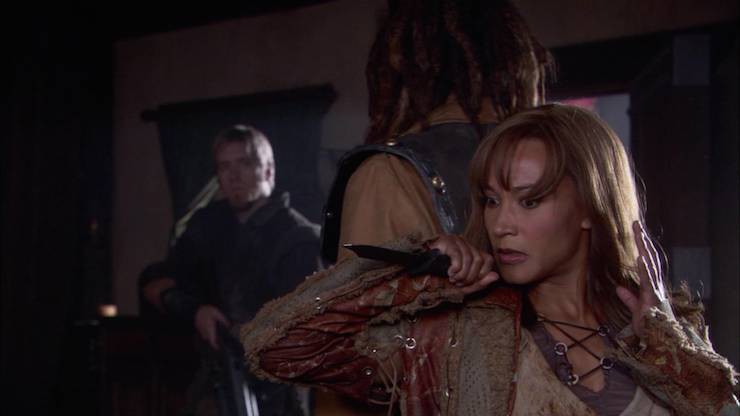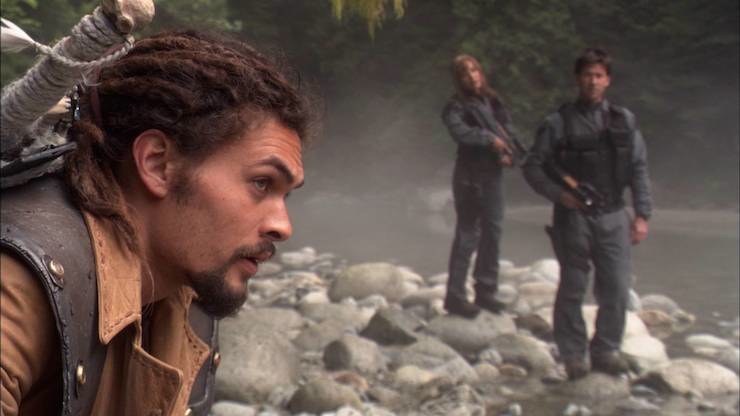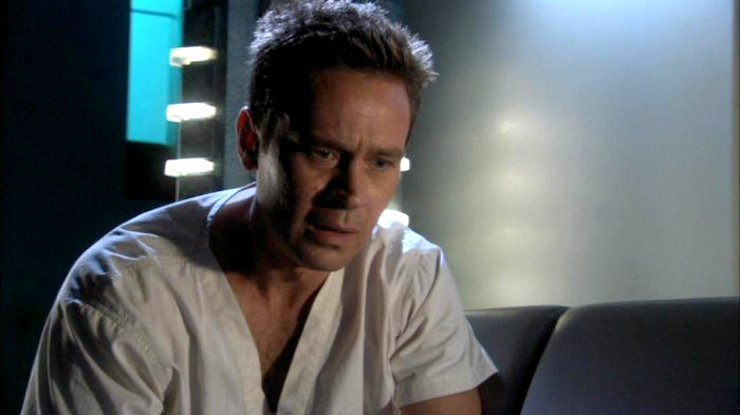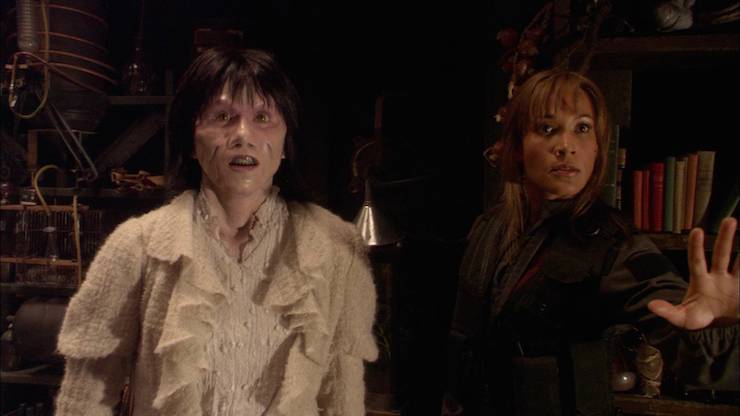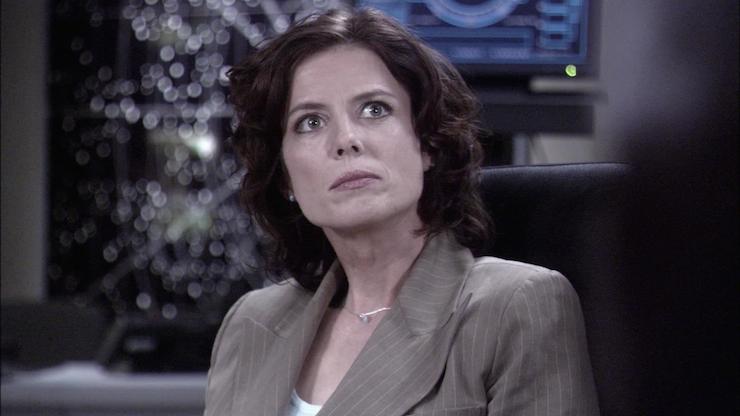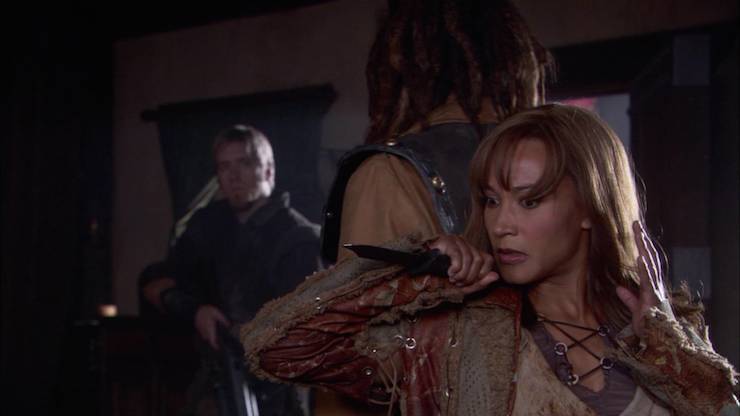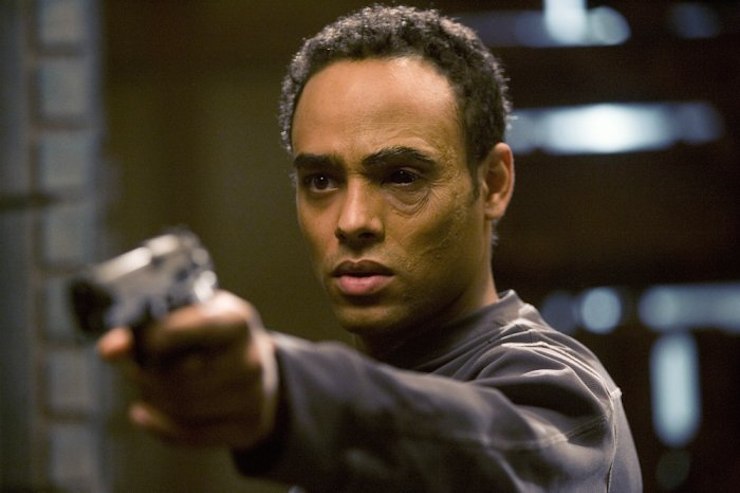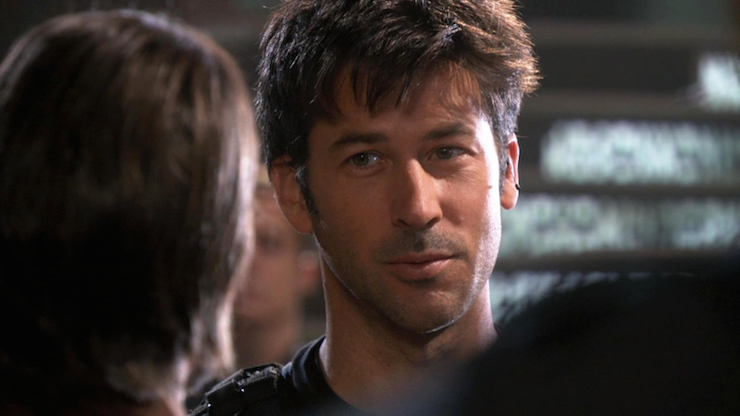Stargate Atlantis Season 2
Executive producers: Robert C. Cooper, Brad Wright
Original air dates: July 15, 2005 – January 30, 2006
Mission briefing. The Daedalus arrives under the command of Colonel Steven Caldwell, destroying the other two hive ships, though Everett is “aged” by the Wraith before it’s all over. That experience allows him to forgive Sheppard for shooting Sumner. With a dozen more hive ships coming, the expedition fakes blowing up the city, using a nuke and switching the shield to cloak mode, making the Wraith think the city is destroyed. They continue to pretend to be nomads to the rest of the galaxy, removing the Atlantis patches from their uniforms when they go offworld. This deception lasts until the end of the season.
Another casualty of the Wraith attack is Ford. A Wraith was in mid-feed of Ford when the former was shot, but that led to the Wraith overloading Ford with an enzyme the Wraith use to make their food more healthy before consuming their life force. Ford is addicted to the enzyme, which also improves his health like whoa, but also makes him paranoid, and he leaves Atlantis, eventually going out on his own and forming a small army of enzyme-addicted super-soldiers. Unfortunately, the impaired judgment leads to a mediocre plan that in turn leads to Sheppard and his team being kidnapped, most of Ford’s army killed (possibly Ford himself, though his final fate remains unclear), and McKay hopped up on the enzyme, forcing Beckett to give him the DTs.
With contact with Earth now a regular thing, thanks to the ZPM installation and the assigning of the Daedalus to the expedition, they can check in regularly with Stargate Command and get reports, resupply, personnel changes, etc. Sheppard is promoted and made true head of the military contingent. While searching for Ford, they find Ronon Dex, a Satedan whom they save from a life of being hunted by the Wraith; he joins Sheppard’s team.
The war against the Wraith continues apace as well. A Wraith attack sucks both McKay and Lieutenant Cadman up in a dart, but after it crashes, there’s only enough power to restore McKay—but Cadman’s consciousness is still in his head, which makes for some awkwardness before Cadman is restored. A planet placates the Wraith by giving them only convicts to feed on—but it becomes necessary to imprison people for lesser crimes to keep the Wraith satiated. And when Sheppard’s team lets the convicts escape, the Wraith have no choice but to turn to the corrupt government…
They also find a couple of Ancient battleships. One is called the Aurora, which has an entire crew in stasis in a virtual reality setting, one that is infiltrated by a Wraith trying to learn the Ancients’ secrets. Another is called the Orion (well, it was actually called the Hippaforalkus, but Sheppard renamed it), and is salvaged from a planet where humans have settled on an abandoned Ancient outpost constructed on a super-volcano that’s about to erupt.
Another world with an Ancient outpost includes an experimental energy source that would, as McKay says, make a ZPM look like a D battery. Unfortunately, the experiment failed, and McKay’s attempt to make it a success also fail, to the tune of destroying 5/6 of the solar system. And a planet that contains a city just like Atlantis has been settled by humans who have created a feudal society where those with the ATA gene rule over those who don’t, using the drones to enforce their rule. They also meet some Ancients who are meditating, hoping to ascend.
Their adventures also bring them across folks who have nothing to do with the Wraith or the Ancients. Two stasis pods containing the last two survivors of a war manage to possess Weir and Sheppard and set them against each other. On Earth, the Trust not only learns of Atlantis, but one of the Goa’uld implants Caldwell and has him set a bomb in the city. The expedition gets caught up in a coup d’etat among the Genii. And a repaired jumper is less well repaired than believed and crashes into the ocean, killing the pilot and almost killing McKay.
Beckett develops a retrovirus designed to remove the Iratus bug elements of a Wraith’s DNA so that only the human remains. The first test doesn’t quite work, turning a Wraith named Ellia into something more Iratus bug-like, and she transfers the retrovirus to Sheppard, who almost gets turned into a bug before Beckett can cure him.
Eventually, they try the retrovirus on a Wraith, who also loses his memory when he reverts to human, a side effect of the retrovirus that proves handy—though not as much as they’d hoped, as their attempts to convince the Wraith that he’s a Marine named “Michael Kenmore” who suffered amnesia doesn’t really take. Michael eventually reverts back to Wraithdom—the retrovirus needs to be administered regularly to be effective—and rejoins his people, along with the intelligence that Atlantis is not blown up.
However, not everything in Wraith-land is sweetness and light. Ford’s bunch learn that there is in-fighting among the Wraith as they came out of hibernation sooner than expected and there isn’t enough food for everyone, because the populations haven’t replenished enough. Sheppard is able to use that to turn one hive ship against another, and Michael and his hive queen also propose an alliance with Atlantis to use the retrovirus to make rival hive ships into humans off which the Wraith can then feed.
That, however, turns out to have been a ruse. The Wraith ally with the expedition in order to obtain the location of Earth—which two hive ships are now heading toward…
Best episode: “Trinity.” My favorite episode of Atlantis in general, one of the best stories in the entire franchise, and a fantastic story on every level. The entire episode is about the theme of mistakes and their consequences, starting simply with Ronon messing up Teyla’s negotiation, and continuing to Kell paying for his mistake in sacrificing the Satedan people for his own survival with his life, and Ronon damaging his friendship with Teyla, all the way to the huge mistake of the Ancients not being able to make the power source work and McKay’s even huger mistake in not only thinking he could fix what they screwed up, but refusing to listen to Zelenka’s (wholly accurate) warning and blowing up most of a solar system as a result. So many great moments: Caldwell’s refreshingly unapologetic assurance that he is indeed eager to use this energy source for a variety of reasons (including as a weapon, but not limited to that), McKay’s citing of Harry K. Daghlian Jr. of the Manhattan Project as a reason to keep working after Collins’s death, Zelenka’s warning to McKay (a speech completely filled with real physics rather than technobabble), McKay’s snotty response, and Sheppard’s impassioned plea to McKay, citing pilots who refused to eject from a damaged plane until it was too late.
Runners-up: “The Siege Part 3,” a slam-bang conclusion to the two-part first-season finale. “Instinct,” a well done morality tale about nature versus nurture, with two well-executed surprises at the end, and a superb performance by Jewel Staite, using her sweet voice and friendly nature to good reverse effect, because you don’t want to believe that Kaylee Frye is a life-sucking alien. “Coup d’Etat,” a nifty little adventure with twists and turns and betrayals and reversals. “Michael,” introducing an impressive recurring antagonist with a heartfelt performance by Connor Trinneer. “Inferno,” a solid adventure story.
Worst episode: “The Tower.” An appallingly predictable, paint-by-numbers palace intrigue episode with no cliché left unused. The only thing that makes the story unique are its use of the ATA gene as part of the whole royal-bloodline thing, and the only thing that makes it watchable is Peter Woodward being Peter Woodward. But it’s still awful.
Runners-up: “The Intruder,” which combines a weak-sauce murder mystery with a new status quo that is a little too pat and unconvincing. (Weir’s reasons for keeping Sheppard and insisting on his promotion boil down to “he’s in the opening credits, we have to keep him,” since Landry and Caldwell’s arguments against him are actually good ones, and Weir doesn’t have a strong argument except “because I say so.”) “Runner,” which is trying too hard to write Ford out and write Ronon in (Ford is far better served by “The Lost Boys” and “The Hive”). “Conversion,” which is the most boring horror story ever, especially since we know Sheppard won’t turn into a bug, and watching him almost do so is spectacularly uninteresting. “Grace Under Pressure,” a lame attempt to do SG-1‘s “Grace,” a waste of an Amanda Tapping guest spot, and which would’ve been better off continuing the McKay-Griffin arguments from the teaser (which was the only entertaining part of the episode) instead of killing Griffin off.
Can’t we just reverse the polarity? One of the strengths of “Trinity” is that it makes use of real physics. I actually recognized most of the terms from Zelenka’s rant to McKay from my admittedly limited knowledge of the field, and it was beautifully done.
These are not the decisions I imagined making. Weir is reduced even further into the supervisor role, getting to shine only in “Condemned,” when she verbally fences with the prime minister and runs rings around him. (She’s also got a good part in “The Long Goodbye,” but that’s more an acting exercise for Torri Higginson, as she isn’t actually Weir for most of the episode.) Otherwise, she’s relegated primarily to staying behind and fretting while Sheppard and the others do the fun stuff, although I did like her ripping McKay a new one at the end of “Trinity,” and the weight of responsibility she had to take on in “Critical Mass” and in “Michael” and “Allies” with regard to the experiment on Michael.
Yes, but I’m also incredibly lazy. Sheppard really does live the stereotype this season, getting rewarded for his maverick behavior with a wholly undeserved promotion, getting turned into a bug (almost), getting laid (twice, in “Epiphany” and “The Tower”), and performing various near-superhuman feats.
I know everything about everything. McKay’s streak of watching people die in front of him continues, most notably with Collins in “Trinity” and Griffin in “Grace Under Pressure.”
They are good trading partners. Teyla’s usefulness to the expedition as an ambassador seems to have been lost, since they don’t meet anybody who actually knows the Athosians this season. Having said that, she has her moments, most notably when tracking the possessed Weir and Sheppard in “The Long Goodbye” (and Caldwell completely trusting her on her own while searching the city) and when she rips Ronon a new one for using her in “Trinity.”
We’re in another galaxy, how much more out can we get? Beckett develops a retrovirus that is intended to help the Wraith by making them human instead of life-sucking aliens. Michael later points out that someone’s nature is not a disease, and it becomes clear that weaponizing the retrovirus is the only way it’s going to be used.
I was just gonna blow it up. Ronon is a Runner, someone the Wraith can’t feed off of for whatever reason, so they let him gad about the galaxy with a tracker, allowing them to hunt him for sport. When Beckett removes the tracker, and with the revelation that the Wraith destroyed his homeworld of Sateda (though he does find some survivors on other worlds, notably in “Trinity”), he joins the Atlantis expedition in general and Sheppard’s team in particular.
It might work, sir. When concussed and trapped in a sinking jumper, McKay hallucinates Carter to help him get out of it. Even though she’s McKay’s delusion, she still snarks him off and is smarter than him—but she is still McKay’s delusion, so she eventually winds up all wet and in her underwear at one point. (McKay will rather stupidly thank her for this, and then admit to the wet-and-in-her-underwear part, in SG-1‘s “The Pegasus Project.”)
You can go ahead and burst into flames now. Landry is tasked with debriefing the expedition after the Wraith are driven off, and he pushes hard for Caldwell to be made the new military commander of Atlantis. He also works with Barrett and Lee to get information to Atlantis about the Goa’uld threat. (At one point he tells Lee that he’ll find a way to do it—”That’s what I pay you for.”)
Wayward home for out-of-work genre actors. Mitch Pileggi, formerly of The X-Files, kicks off his recurring role as Caldwell, a character who will continue to appear on and off until the final episode. The similarly named Jewel Staite (Firefly) and Brent Stait (Gene Roddenberry’s Andromeda, plus he also played Feretti in SG-1) both put in appearances as Wraith, the former in “Instinct,” the latter in “Allies.” (Staite will return in season three as Dr. Jennifer Keller, becoming an opening-credits regular in the fifth season.) Star Trek: Enterprise‘s Connor Trinneer commences the recurring antagonist of Michael. The Invisible Man‘s Brandy Ledford appears in “Inferno” (having already appeared as a Tok’ra on SG-1) and Babylon 5‘s Peter Woodward appears in “The Tower.” Plus Star Trek‘s Colm Meaney is back, making his final appearance as Cowen in “Coup d’Etat.”
Trivial matters. This season aired alongside SG-1 season 9, and has the expedition in contact with Earth on a regular basis with a 304 ship assigned to it for ship-based support in the Pegasus Galaxy and also supply and personnel runs to and from Earth (the Daedalus is the main ship, though in future the Odyssey and Apollo will also serve that function).
After the first three episodes, the opening credits were changed, removing Rainbow Sun Francks as Ford and adding both Paul McGillion and Jason Momoa as, respectively, Beckett and Ronon. Francks appears again in “The Lost Boys” and “The Hive” as a guest star.
In addition to Pileggi, this season brought in Kavan Smith as Lorne. Having previously appeared in SG-1‘s “Enemy Mine,” Lorne was made the second in command of the military contingent on Atlantis under Sheppard. Like Pileggi, he will recur to the series’ end. This season also introduced the character of Cadman, played by Jaime Ray Newman, who appeared in two episodes and would be referenced again afterward. “Trinity” also features Christopher Gauthier. Gauthier, Smith, and Newman will all later star on Eureka.
Trinneer was unavailable to play Michael in “Allies” due to the birth of his child, so Brent Stait played the role physically, with Trinneer dubbing in the voice during post-production.
Beau Bridges appears twice as Landry, in “The Intruder” and “Critical Mass.” In season 9 of SG-1, he appeared in 18 episodes, thus fulfilling his contract to appear in 20 episodes without requiring an extra budget item to have him guest star on Atlantis. In addition to Bridges, SG-1 recurring regulars Bill Dow (Lee), Peter Flemming (Barrett), and Gary Jones (Harriman) also appear in “Critical Mass,” which is also the one and only time the Goa’uld appear in Atlantis. (SG-1 will return the favor in season 10 with the Wraith making their one and only appearance on that show, alongside several Atlantis regulars, in “The Pegasus Project.”)
Ellie Harvie shows up twice as Novak, a role she commenced in “Prometheus Unbound” on SG-1 as part of the crew of Prometheus that was trying to reach Atlantis. She did make it eventually, and she still gets the hiccups when she’s nervous…
The Daedalus has an Asgard engineer on board named Hermiod. His appearance in “The Siege Part 3” is the first appearance of an Asgard on Atlantis. Sheppard’s response to the Asgard is similar to Mitchell’s on SG-1, to wit, a bit put off by the fact that they don’t wear clothes.
In “Epiphany,” McKay refers to Ronon and Teyla as “Conan and Xena,” which was prescient, as Jason Momoa would go on to play the title role in 2011’s Conan the Barbarian.
Chevron seven locked. This may be Atlantis‘s strongest season, partly just by virtue of the fact that it has “Trinity” in it, which is one of the finest episodes of the entire franchise, not just Atlantis. But it also starts the arc with Michael in his titular episode, which is one of the most fascinating running themes in the series, as the ethical lines are crossed more than once.
Speaking of ethical lines, the show if anything doesn’t do enough with the moral quandaries the expedition faces. In particular, the decision to let Ronon torture Kavanagh in the hopes of getting information out of him in “Critical Mass” doesn’t get nearly enough play, and it particularly ignores Weir’s own established history as a negotiator who objects to military intervention as anything but a last resort. Someone with her background would know that torture is wholly ineffective as a means of information-gathering. (The punchline being, of course, that it was, in fact, ineffective here, too, mostly because Kavanagh fainted at the very sight of Ronon, plus there’s the fact that Kavanagh was completely innocent.)
Still, the fact that it was even a quandary instead of a go-to technique was a victory given when the show aired (when this country was in the midst of post-9/11 hysteria, the PATRIOT Act, and torture being used by our government as an interrogation tool—one that didn’t actually work, of course). But I wish the show had done more with it.
That, however, would have required actually using the character of Elizabeth Weir, something the show’s writers evinced no interest in doing after “Condemned,” the one and only time in the entire season that Weir-the-negotiator was allowed to actually do her job. (She sort of did in “Inferno” also, but the crisis stomped all over her negotiation, and she was just left to babysit the survivors. Snore.)
Having said that, the other characters get to shine. Lorne is a solid addition to the military personnel on the expedition. Zelenka’s role increases quite nicely from his bravura performance in “Trinity” to his comic relief at the beginning and end of “Critical Mass” to his taking on the McKay role while he’s trapped underwater in “Grace Under Pressure” to his tag-teaming with Beckett to try to solve the delivery system problem in “Allies.” Sheppard gets any number of spotlights, and only really blows it in “Conversion.” Even Ford gets a good last hurrah after being written out in “The Lost Boys” and “The Hive.”
Keith R.A. DeCandido has stories in two upcoming anthologies being published by IDW and edited by Jonathan Maberry: the story “Back in El Paso My Life Will Be Worthless” in The X-Files: Trust No One (pre-order from Amazon or Barnes & Noble) and the story “Streets of Fire” in V-Wars: Night Terrors (pre-order from Amazon or Barnes & Noble).










